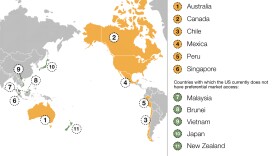By Richard Nelson
http://stream.publicbroadcasting.net/production/mp3/wkms/local-wkms-931744.mp3
Murray, KY – Last week, NPR terminated the contract of Senior News Analyst Juan Williams, due to remarks made on The O'Reilly Factor that were inconsistent with NPR's editorial standards and practices. The action has since sparked a national debate over the issues of political correctness and the freedom of speech. Commentator Richard Nelson says the sensitivity police's war on honesty claims another victim, furthering the divide between the political right and left.
Sensitivity police's war on honesty claims another victim
NPR's firing of Juan Williams furthers divide between political right and left
If America's freedom of speech is the envy of the world, then political correctness must be its bane. Some political candidates and news commentators this election season are finding that out the hard way. Just last week, the monster of political correctness raised its ugly head and resulted in the firing of Juan Williams by National Public Radio.
Williams, a long-time civil rights advocate, told Bill O'Reilly that "political correctness can lead to some kind of paralysis where you don't address reality when I get on a plane if I see people who are in Muslim garb and I think, you know, they're identifying themselves first and foremost as Muslims, I get worried, I get nervous."
Is this not the same thought also shared by many frequent airline travelers? Yet because of the perceived offense, it was a thought NPR execs believed best kept out of the public arena, so they fired him.
But was it really a wise move in a time when the divide between the political left and right has never been greater? NPR reported that Williams' presence on "Fox News has long been a sore point with NPR News executives." Why? NPR is known for its eloquence and dialogue, but instead of fostering communication between the two sides, they fired an accomplished ambassador for the left. Even as William's actually warned O'Reilly against painting Muslims with broad brushstrokes, NPR painted him with a broad brushstroke and fired him. So the cold war of ideology continues.
What thinkers on both the left and right can agree upon is that the war radical Islam has declared on the West has kindled the fears of many, and has sometimes led to intolerance and bigotry toward Muslims who don't subscribe to violence. But the war on ideas and politically incorrect opinion by the speech patrol has wider ranging consequences. We should insist upon respect and high standards of dialogue, but don't we expect our leaders and analysts to tell us the truth? Or are some thoughts just too offensive to be aired publicly? Juan Williams is no Bobby Seale. Nor was he advocating the burning of the Koran. So why was he lumped in with extremists?
I have a friend in Belgium who has decried political correctness in Europe for years. It is now a rare individual who speaks out against radical Islam. And for those who do including journalists who caricature Mohammed, they face death threats. If they are willing to come out of hiding, then they face legal proceedings from a society so steeped in political correctness that it has lost its ability to think or respect individual thought.
A new Rasmussen Reports released on Oct. 19, found that 74 percent of Americans regard political correctness as a problem in the United States today. Rasmussen also found that 63 percent blamed political correctness for preventing "the U.S. military from responding to warning signs that could have prevented Major Nidal Malik Hasan from massacring 13 people and wounding many others at Fort Hood, Texas."
When the whitewashing of language and laundering of ideas leads to collective stupidity, then it's time to reevaluate. When political correctness out of fear of offending someone or some group eviscerates civil discourse, what have we gained? Respect and tolerance have always been and always should be benchmarks of civil discussion and standards by which any media should live by. But as George Orwell once said, "We have now sunk to a depth at which the restatement of the obvious is the first duty of intelligent men."
It's time as Americans to assert that we still have the right to restate the obvious. Hopefully, the rest of the media will join us.
Richard Nelson is a policy analyst for The Family Foundation, a non-profit public policy organization. He currently resides in Trigg County with his family. If you have an opinion, interest or review you'd like to share with WKMS listeners, see guidelines on the commentaries page of our web site and send us an email.





